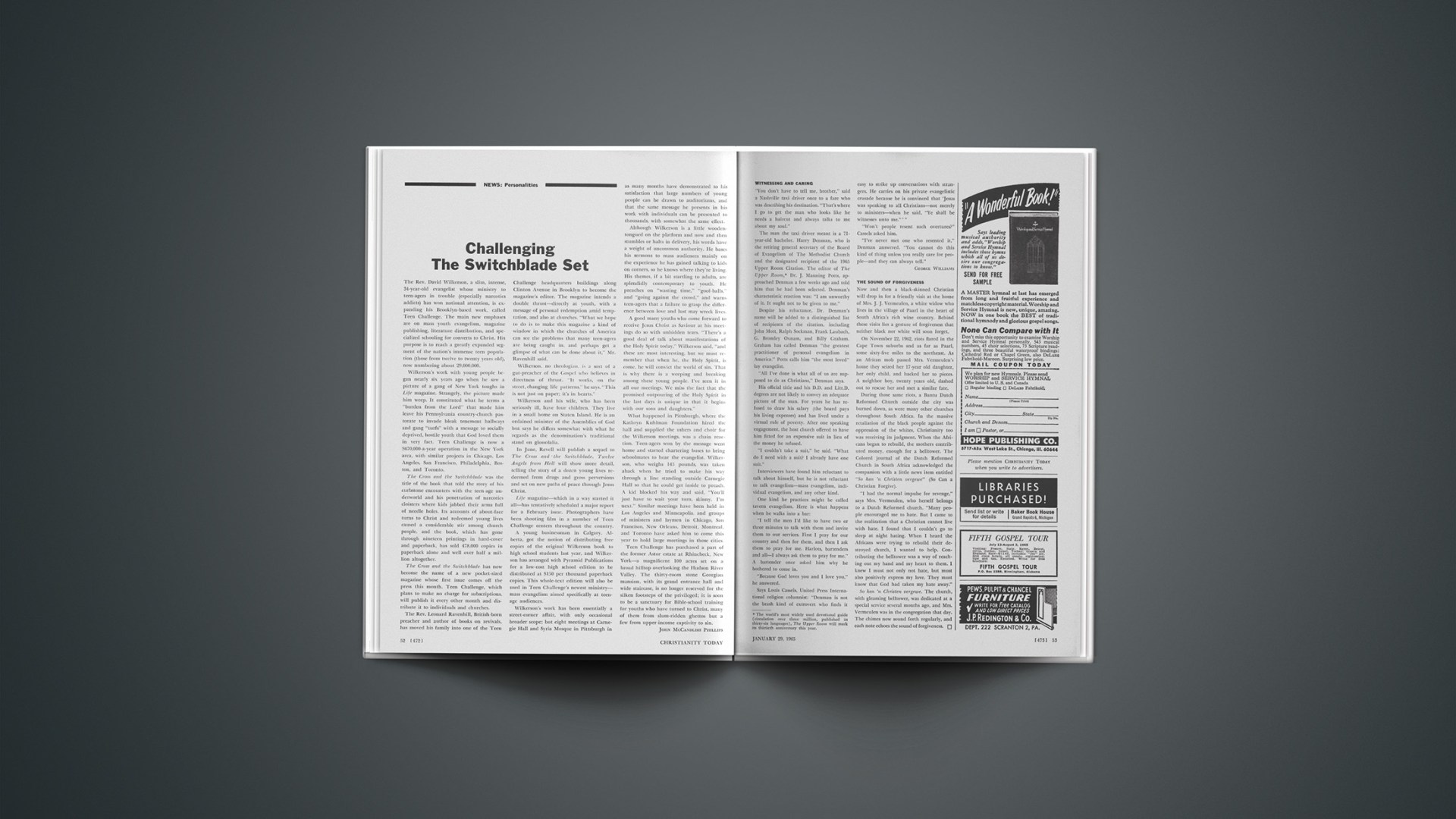Witnessing And Caring
“You don’t have to tell me, brother,” said a Nashville taxi driver once to a fare who was describing his destination. “That’s where I go to get the man who looks like he needs a haircut and always talks to me about my soul.”
The man the taxi driver meant is a 71-year-old bachelor, Harry Denman, who is the retiring general secretary of the Board of Evangelism of The Methodist Church and the designated recipient of the 1965 Upper Room Citation. The editor of The Upper Room,1The world’s most widely used devotional guide (circulation over three million, published in thirty-six languages), The Upper Room will mark its thirtieth anniversary this year. Dr. J. Manning Potts, approached Denman a few weeks ago and told him that he had been selected. Denman’s characteristic reaction was: “I am unworthy of it. It ought not to be given to me.”
Despite his reluctance, Dr. Denman’s name will be added to a distinguished list of recipients of the citation, including John Mott, Ralph Sockman, Frank Laubach, G. Bromley Oxnam, and Billy Graham. Graham has called Denman “the greatest practitioner of personal evangelism in America.” Potts calls him “the most loved” lay evangelist.
“All I’ve done is what all of us are supposed to do as Christians,” Denman says.
His official title and his D.D. and Litt.D. degrees are not likely to convey an adequate picture of the man. For years he has refused to draw his salary (the board pays his living expenses) and has lived under a virtual rule of poverty. After one speaking engagement, the host church offered to have him fitted for an expensive suit in lieu of the money he refused.
“I couldn’t take a suit,” he said. “What do I need with a suit? I already have one suit.”
Interviewers have found him reluctant to talk about himself, but he is not reluctant to talk evangelism—mass evangelism, individual evangelism, and any other kind.
One kind he practices might be called tavern evangelism. Here is what happens when he walks into a bar:
“I tell the men I’d like to have two or three minutes to talk with them and invite them to our services. First I pray for our country and then for them, and then I ask them to pray for me. Harlots, bartenders and all—I always ask them to pray for me.” A bartender once asked him why he bothered to come in.
“Because God loves you and I love you,” he answered.
Says Louis Cassels, United Press International religion columnist: “Denman is not the brash kind of extrovert who finds it easy to strike up conversations with strangers. He carries on his private evangelistic crusade because he is convinced that ‘Jesus was speaking to all Christians—not merely to ministers—when he said, “Ye shall be witnesses unto me.” ’
“Won’t people resent such overtures?” Cassels asked him.
“I’ve never met one who resented it,” Denman answered. “You cannot do this kind of thing unless you really care for people—and they can always tell.”
GEORGE WILLIAMS
The Sound Of Forgiveness
Now and then a black-skinned Christian will drop in for a friendly visit at the home of Mrs. J. J. Vermeulen, a white widow who lives in the village of Paarl in the heart of South Africa’s rich wine country. Behind these visits lies a gesture of forgiveness that neither black nor white will soon forget.
On November 22, 1962, riots flared in the Cape Town suburbs and as far as Paarl, some sixty-five miles to the northeast. As an African mob passed Mrs. Vermeulen’s home they seized her 17-year old daughter, her only child, and hacked her to pieces. A neighbor boy, twenty years old, dashed out to rescue her and met a similar fate.
During those same riots, a Bantu Dutch Reformed Church outside the city was burned down, as were many other churches throughout South Africa. In the massive retaliation of the black people against the oppression of the whites, Christianity too was receiving its judgment. When the Africans began to rebuild, the mothers contributed money, enough for a belltower. The Colored journal of the Dutch Reformed Church in South Africa acknowledged the compassion with a little news item entitled “So kan ‘n Christen vergewe” (So Can a Christian Forgive).
“I had the normal impulse for revenge,” says Mrs. Vermeulen, who herself belongs to a Dutch Reformed church. “Many people encouraged me to hate. But I came to the realization that a Christian cannot live with hate. I found that I couldn’t go to sleep at night hating. When I heard the Africans were trying to rebuild their destroyed church, I wanted to help. Contributing the belltower was a way of reaching out my hand and my heart to them. I knew I must not only not hate, but must also positively express my love. They must know that God had taken my hate away.”
So kan ‘n Christen vergewe. The church, with gleaming belltower, was dedicated at a special service several months ago, and Mrs. Vermeulen was in the congregation that day. The chimes now sound forth regularly, and each note echoes the sound of forgiveness.










